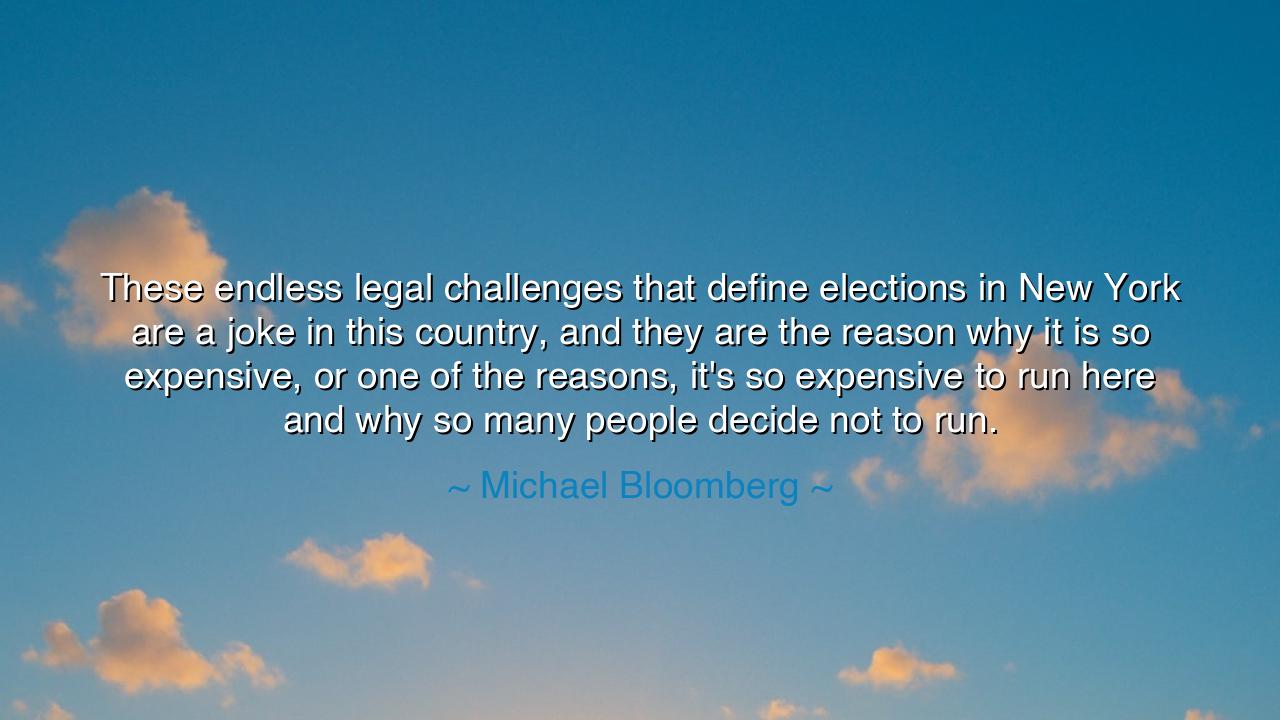
These endless legal challenges that define elections in New York
These endless legal challenges that define elections in New York are a joke in this country, and they are the reason why it is so expensive, or one of the reasons, it's so expensive to run here and why so many people decide not to run.






The words of Michael Bloomberg rise like a lament over the city that never sleeps: “These endless legal challenges that define elections in New York are a joke in this country, and they are the reason why it is so expensive, or one of the reasons, it’s so expensive to run here and why so many people decide not to run.” In this saying we hear the voice of one who has walked the path of power and has seen firsthand the snares that lie hidden in the democratic road. Bloomberg speaks not against law itself, but against the abuse of law, when the noble tool of justice is twisted into an endless maze of obstacles that suffocate participation and silence the voices of the willing.
At the heart of his words lies the recognition that democracy must be open and accessible, not chained by the weight of legal wrangling. The endless legal challenges he condemns are not the healthy debates of ideas, but the sharp weapons of technicality and litigation. These battles are not waged to uplift the people’s voice, but to dissuade, delay, and drain the resources of those who would dare to stand. In such a system, elections are no longer contests of vision, but trials of endurance, where only the wealthy and the well-connected can survive.
The ancients also knew this danger. In the waning days of the Roman Republic, the courts became entangled with politics, and powerful men learned that lawsuits and prosecutions could silence rivals more effectively than open debate. Justice, once the safeguard of the people, became a shield for the elite and a sword against reformers. The Republic faltered, not only from violence in the streets, but from the corrosion of its laws by ambition. What Bloomberg describes in New York is but a reflection of this same ancient peril: when the law is wielded not for fairness but for power, the spirit of democracy suffers.
We must not mistake his words as a call for lawlessness. No, law is the guardian of order, the foundation of justice. But Bloomberg warns that when legal challenges become endless, they cease to protect the people and instead protect privilege. They transform elections into games for the wealthy alone, while ordinary men and women, who might bring fresh vision and integrity, are driven away by cost and complexity. Thus, a democracy meant to be rich with many voices becomes poor, diminished to a chorus of the few.
History offers us a contrasting vision of courage against such barriers. Consider the story of Vaclav Havel, playwright turned president of Czechoslovakia. Though hounded by lawsuits, surveillance, and imprisonment under an oppressive regime, he rose to leadership through sheer resilience and the unquenchable power of ideas. His life teaches that true democracy flourishes when the path to leadership is open not just to the powerful, but to those with conviction, creativity, and conscience. Bloomberg’s words warn us that if legal snares continue to choke elections, many Havels of our own time may never rise, silenced before they even begin.
The lesson, then, is plain: if democracy is to live, its doors must remain open. We must strip away unnecessary burdens, reform systems that favor wealth over will, and create conditions where the contest of leadership is measured by vision, not by the size of a war chest. Let laws protect fairness, but not be twisted into chains. Let courts guard justice, but not become the battlefield of endless contention. Above all, let the people’s voice—not the lawyers’ brief—be the final judge of elections.
Therefore, children of tomorrow, take heed: do not allow your democracy to become a luxury only the rich can afford. Demand reforms that simplify the road, lower the cost, and lift the barriers. Support leaders not for the money they wield but for the integrity they carry. And when you see the noble tool of law bent into an instrument of exclusion, raise your voice. For only when democracy is wide open, accessible, and fair can it truly reflect the will of the people, and only then can it be called worthy of the name.






AAdministratorAdministrator
Welcome, honored guests. Please leave a comment, we will respond soon